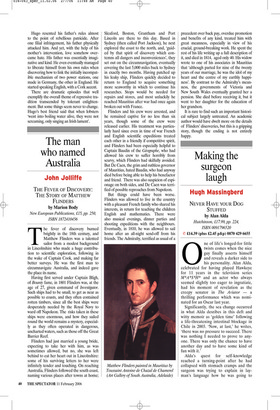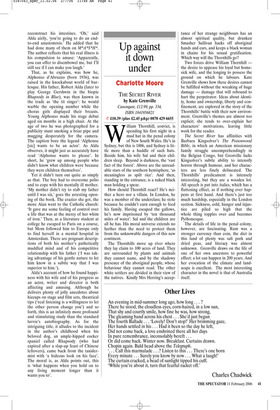Making the surgeon laugh
Hugh Massingberd
NEVER HAVE YOUR DOG STUFFED by Alan Alda Hutchinson, £17.99, pp. 224, ISBN 0091796520 ✆ £14.39 (plus £2.45 p&p) 0870 429 6655 One of life’s longed-for little twists comes when the nice guy finally asserts himself and reveals a darker side to his personality. Alan Alda, celebrated for having played Hawkeye for 11 years in the television series M*A*S*H* and an actor who always seemed slightly too eager to ingratiate, had his moment of revelation as the creepy senator in The Aviator — a thrilling performance which was nominated for an Oscar last year.
Significantly, the sea change occurred in what Alda desribes in this deft and witty memoir as ‘golden time’ following a life-threatening intestinal blockage in Chile in 2003. ‘Now, at last,’ he writes, ‘there was no pressure to succeed. There was nothing I needed to prove to anyone. There was only the chance to have another day and to have some kind of fun with it.’ Alda’s quest for self-knowledge reached a turning-point after he had collapsed with stomach cramps and the surgeon was trying to explain in layman’s language how he was going to reconstruct his intestines. ‘Oh,’ said Alda airily, ‘you’re going to do an endto-end anastomosis.’ He added that he had done many of them on M*A*S*H*. The author reflects that his real illness is his compulsion to amuse: ‘Apparently, you can offer to disembowel me, but I’ll still see if I can make you laugh.’ That, as he explains, was how he, Alphonso d’Abruzzo (born 1936), was raised in the knockabout world of burlesque. His father, Robert Alda (later to play George Gershwin in the biopic Rhapsody in Blue), was then known in the trade as ‘the tit singer’: he would warble the opening number while the chorus girls displayed their breasts. Young Alphonso made his stage debut aged six months in a high chair. At the age of two he was photographed for a publicity stunt smoking a briar pipe and mugging desperately for the camera. The caption bore the legend ‘Alphonse [sic] wants to be an actor’. As Alda observes, it might just as accurately have read ‘Alphonse wants to please’. In short, he ‘grew up among people who didn’t know what children were because they were children themselves’.
Yet it didn’t turn out quite as simply as that. The boy had to overcome polio and to cope with his mentally ill mother. ‘My mother didn’t try to stab my father until I was six,’ goes the arresting opening of the book. The crazier she got, the more Alan went to the Catholic church: ‘It gave me some feeling of control over a life that was at the mercy of her whim of iron.’ Then, as a literature student at college he escaped to Paris on a course, but Mom followed him to Europe only to find herself in a mental hospital in Amsterdam. There are poignant descriptions of both his mother’s pathetically muddled mind and of his competitive relationship with his father (‘I was taking advantage of his gentle nature to let him know in a subtle way that I was superior to him.’).
Alda’s account of how he found happiness with his wife and of his progress as an actor, writer and director is both affecting and amusing. Although he delivers plenty of jolly anecdotes about hiccups on stage and film sets, theatrical tips (‘real listening is a willingness to let the other person change you’) and so forth, this is an infinitely more profound and stimulating study than the standard luvvie’s autobiography. As for the intriguing title, it alludes to the incident in the author’s childhood when his beloved dog, an ample-hipped cocker spaniel called Rhapsody (who had expired after a slap-up feast of Chinese leftovers), came back from the taxidermist with ‘a hideous look on his face’. The moral is, as Alda points out, this is ‘what happens when you hold on to any living moment longer than it wants you to’.















































 Previous page
Previous page